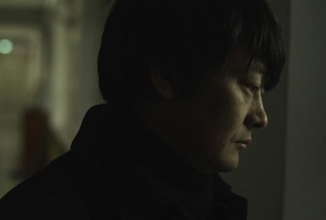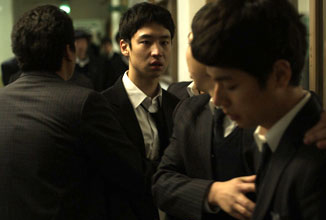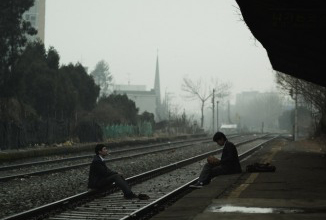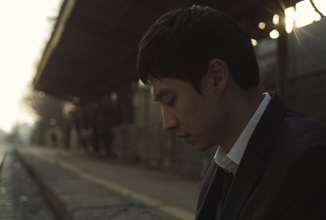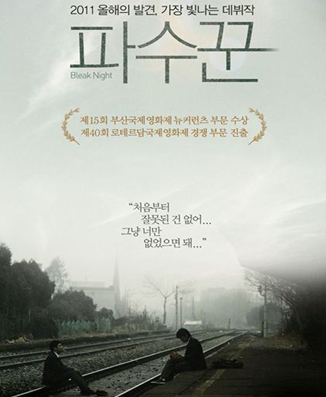"Do you know how much I laugh inside when you say only I can understand you?
Don't think I was ever your friend... You disgust me."
Synopsis:
Following the suicide of high school student Gi-tae (Lee Je-hoon), his father (Jo Seong-ha) attempts to find his son’s closest friends, Hee-joon (Park Jeong-min) and Dong-yoon (Seo Jun-yeong), in an effort to discover why Gi-tae chose to take his own life.
However, almost immediately he finds himself facing a wall of virtual silence, with Hee-joon only reiterating the fact that he moved schools weeks before Gi-tae’s death and claiming that Dong-yoon dropped out of school and virtually disappeared.
While Gi-tae’s father tries to get Hee-joon to open up to him, the boys’ stories are gradually told in flashback, and as cracks begin to show in their relationships, we watch as their friendships slowly fall apart, camaraderie being increasingly replaced by animosity…
Review:
Friendships are rarely as straightforward as a cursory glance would suggest, especially in our formative years. Even barely scratch the surface, and black and white can almost be guaranteed to crumble to reveal a myriad of grey. Add testosterone-fueled masculine aggressiveness, hiding deep inner feelings and growing psychological scars, to the mix and you'll have difficulty preventing the resultant powder keg from being ignited, and thus the only uncertainty becomes the question of whether that psychological time bomb will ultimately explode, implode, or both.
The first scene we witness in Bleak Night is a flashback to two (at this stage, unnamed) boys of high school age viciously fighting (or, more accurately, one boy being beaten up by the other and his companions), and such is the ferocity and downright venom of the altercation that the last thing one would assume is that these boys are friends - the scene immediately referencing the idea that any friendship or relationship is far more complicated and multi-layered than can be gleaned from first impressions.
Directly following this scene, the film jumps to the present day and we are introduced to Gi-tae's father, and as he tries to find the truth behind his son's death, the stories of the boys’ friendships gradually unfold in parallel.
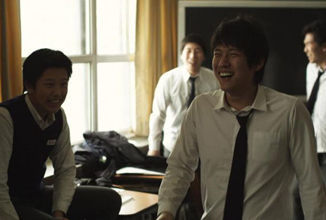 |
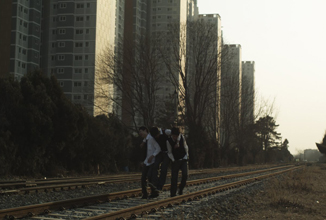 |
Though stories detailing themes of changing, and disintegrating, friendships; the pitfalls of adolescence; peer pressure and bullying; as well as broken families, are fairly common in South Korean cinema, Bleak Night delves a great deal more deeply than most, and while the fact that the narrative unfolds almost incrementally for a large portion of the film may mean that some find the pacing (certainly in the first half of the film) slower than they would ideally like, to my mind the time taken is not only warranted but is, in fact, necessary in order to allow for the palpable and ever-building feeling of tension to positively scream that the aforementioned powder keg could, and likely will, explode at any moment. And when it does, as we knew it would sooner or later, Bleak Night majorly shifts up several gears to become a gripping insight into the spiraling consequences of actions and the resultant reactions to them.
However, Bleak Night goes yet further, discussing culpability, guilt and the perception of blamelessness. While both Hee-joon and Dong-yoon claim to be innocent of any involvement in the events which led to Gi-tae’s demise, it becomes increasingly clear that regardless of whether or not they honestly believe their protestations (or if they are, in fact, lying to themselves as much as to others), not a single one of the boys (Gi-tae included) could be said to be truly blameless, and the fact that no action or reaction is ever an isolated, finite event, is repeatedly shown.
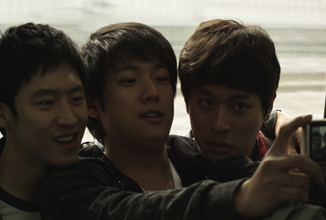 |
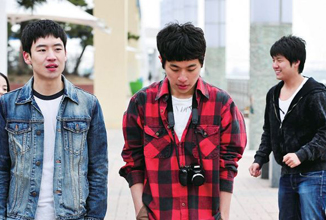 |
As a final note on the themes present within Bleak Night, it pretty much goes without saying that with the narrative focused around a group of male characters, the vast majority of the themes centre on masculinity and male characteristics. However, there is one small scene (at around two thirds of the way through the film) which not only shows how utterly different female perceptions of, and reactions to, events within relationships are to those of males, but also allows each to be compared and contrasted beautifully:
With the growing
problems within his friendship with Gi-tae filling his thoughts, Dong-yoon is noticeably monosyllabic on a night out with his girlfriend, Se-jung, but while he follows the typically male characteristic of keeping his worries and feelings to himself, remaining outwardly strong and not sharing (or even mentioning) them, she (assuming that his quietness is because he is becoming bored with her) instantly brings the subject up in conversation and asks him to give her his watch, which holds great sentimental value for him. When he asks her why, she, without a second thought, says "Because, if I take your watch, I know that I'll see you again." Open, honest, empathetic and eager to talk through problems before they escalate, Se-jung personifies every character trait that the boys try to hide, dismiss or deny.
 |
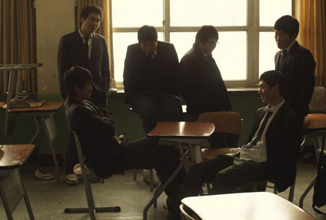 |
Cinematically, Bleak Night is an indie film, through and through. The film was, in fact, director Yoon Sung-hyun's graduation project at the Korean Academy of Film Arts, but it never appears so and, ultimately, any director would likely be proud to have produced such an accomplished, nuanced and multi-layered work. Visuals throughout contain muted (some might say bleak) colours, mirroring the grim reality facing the main characters and though the judicious use of hand held camera work could be said to be somewhat predictable, it nonetheless serves to accentuate the realistic tone present and even, to a degree, the growing instability of the friendships and indeed the boys themselves.
Summary:
A multi-layered, multi-themed dissection of adolescence, Bleak Night delves into issues of peer pressure, bullying, guilt, blame and culpability within a brooding, yet gripping, tale of the intricacies and difficulties of relationships.
Cast:
The performances of the entire cast of Bleak Night are top notch throughout, especially considering the young ages of the majority of the main actors. While, initially, Lee Je-hoon’s portrayal of Gi-tae is the most overt and noticeable (largely due to his character’s increasing arrogant aggressiveness) the acting of both Park Jeong-min (as Hee-joon) and Seo Jun-yeong (as Dong-yoon), is equally nuanced. Each adds a great deal to the realism of the narrative and the believability of their characters' actions and reactions, or deliberate lack thereof.
Main actors:
Lee Je-hoon, Park Jeong-min, Seo Jun-yeong, Jo Seong-ha
DVD
The DVD edition reviewed here is the Korean (Region 3) Single Disc Edition from Filament Pictures. The film is presented as an anamorphic transfer with an aspect ratio of 1.85:1 and there are no image artifacts (and no ghosting) present.
The original Korean language soundtrack is provided as a choice of Dolby Digital 5.1 and Dolby Digital 2.0 and is crystal clear and well balanced throughout.
The English subtitles provided for the main feature are of high quality with only a couple of minor grammatical/spelling errors present.
English-speaking viewers should note that, as with many Korean DVD releases, there are no subtitles available on any of the extras.
DVD Details:
• Director: Yoon Sung-hyun
• Format: NTSC, Anamorphic, Widescreen, Subtitled
• Language: Korean
• Subtitles: English, Korean, None
• Sound: Dolby Digital 5.1, Dolby Digital 2.0
• Region: Region 3
• Aspect Ratio: 1.85:1
• Number of discs: 1
• Classification: 15
• Distribution: Filament Pictures
• Run Time: 117 minutes (approx.)
DVD Extras:
• Director's Commentary
• Short Film 'Children' (32 minutes)
• Theatrical Trailer
|


